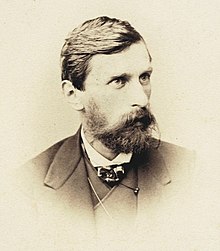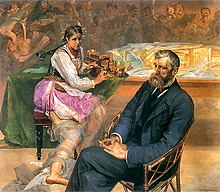fiction.wikisort.org - Writer
Adam Asnyk (11 September 1838 – 2 August 1897), was a Polish poet and dramatist of the Positivist era. Born in Kalisz to a szlachta family, he was educated to become an heir of his family's estate. As such he received education at the Institute of Agriculture and Forestry in Marymont and then the Medical Surgeon School in Warsaw. He continued his studies abroad in Breslau, Paris and Heidelberg. In 1862 he returned to Congress Poland and took part in the January Uprising against Russian rule. Because of that he had to flee his country and settled in Heidelberg, where in 1866 he received a doctorate of philosophy. Soon afterwards he returned to Poland and settled in the Austrian-held part of the country, initially in Lwów and then in Kraków.
Adam Asnyk | |
|---|---|
 Adam Asnyk | |
| Born | Adam Asnyk 11 September 1838 Kalisz, Congress Poland |
| Died | 2 August 1897 (aged 58) Kraków, Austria-Hungary |
| Resting place | Skałka Cemetery in Kraków |
| Occupation | Poet |
| Language | Polish |
| Nationality | Polish |
| Signature | |
Life and work

In 1875 Asnyk married Zofia née Kaczorowska, with whom he had a son, Włodzimierz, and around that time started his career as a journalist. An editor of a Kraków-based Reforma daily, in 1884 he was also chosen to the city council of Kraków. Five years later he was elected to the Diet of Galicia and Lodomeria.
Around that time he became one of the most prominent men of culture in partitioned Poland. Among his initiatives was the creation of the Society of Popular Schools and bringing the ashes of Adam Mickiewicz to Poland. He was also among the first members of the Tatra Society. He died on 2 August 1897 in Kraków and was buried at the Skałka church, a burial place for some of the most distinguished Poles, particularly those who lived in Kraków.
Mastery of Verse
Adam Asnyk was a master of verse. Some of his poems, for example Ulewa (The Heavy Rain) or Daremne żale (The Vain regrets), are among the best examples of iambic metre in all of Polish literature. He also used sophisticated strophes, for instance ottava rima. The poem Wśród przełomu[1] (At the breakthrough) is perhaps the first use of rhyme royal in original Polish poetry. His versification was often discussed by prominent Polish scholars, among others by Maria Dłuska and Lucylla Pszczołowska.[2]
Books of poetry
- Nad głębiami (Over the Depths) (1883–1894)
- Poezje (Poetries) (1869)
- Poezje (Poetries) (1872)
- Poezje (Poetries) (1880)
- Poezje (Poetries) (1894)
See also
- Positivism in Poland
References
- Original Text
- See also: Wiktor Jarosław Darasz, Mały przewodnik po wierszu polskim, Kraków 2003 (in Polish).
External links
- Adam Asnyk at Find a Grave
- Polish Literature in English Translation: Adam Asnyk
- Works by Adam Asnyk at Project Gutenberg
- Works by or about Adam Asnyk at Internet Archive
- Adam Asnyk collected works (Polish)
- Works by Adam Asnyk at LibriVox (public domain audiobooks)

На других языках
- [en] Adam Asnyk
[es] Adam Asnyk
Adam Asnyk (Kalisz, Polonia, 11 de septiembre de 1838 - Cracovia, Austria-Hungría, 2 de agosto de 1897) fue un poeta y dramaturgo polaco, miembro de la szlachta e integrante del Levantamiento de Enero.[fr] Adam Asnyk
Adam Asnyk, né le 11 septembre 1838 à Kalisz et mort le 2 août 1897 à Cracovie, est un poète et dramaturge polonais.[ru] Аснык, Адам
А́дам А́снык (польск. Adam Asnyk; 11 сентября 1838 — 2 августа 1897) — польский литератор, поэт и драматург; в его поэзии выражено сочетание романтизма с общественно-философскими проблемами позитивизма.Другой контент может иметь иную лицензию. Перед использованием материалов сайта WikiSort.org внимательно изучите правила лицензирования конкретных элементов наполнения сайта.
WikiSort.org - проект по пересортировке и дополнению контента Википедии